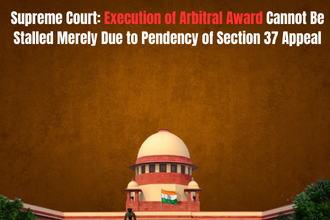The Supreme Court of India recently delivered a scathing judgment against the Bar Council of Maharashtra and Goa (BCMG) for initiating frivolous and baseless disciplinary proceedings against two advocates — Rajiv Nareshchandra Narula and Geeta Ramanugrah Shastri. The Court not only quashed the complaints but also imposed ₹1 lakh in total costs on BCMG and an additional ₹50,000 fine on a complainant, sending a strong message against malicious litigation and misuse of disciplinary mechanisms under the Advocates Act, 1961.
The ruling came in the case titled Bar Council of Maharashtra and Goa v. Rajiv Nareshchandra Narula & Ors, decided by a Bench comprising Justices Vikram Nath and Sandeep Mehta on September 24, 2025.
Background of the Case
The controversy originated from two separate complaints filed before BCMG, both of which were later referred to its Disciplinary Committee under Section 35 of the Advocates Act, 1961.
- The first complaint was against Advocate Rajiv Narula, concerning his alleged role in consent terms of a civil suit dating back to 1985.
- The second complaint was against Advocate Geeta Ramanugrah Shastri, who had merely identified the deponent of an affidavit and certified some documents.
Despite the flimsy grounds, BCMG proceeded to act on these complaints, prompting both advocates to challenge the actions before the Bombay High Court and eventually the Supreme Court.
Complaint Against Advocate Rajiv Narula
The complainant alleged that Narula committed professional misconduct in relation to the settlement terms of a 1985 civil suit. The grievance was that the complainant’s property was fraudulently included in the consent terms, which Narula had allegedly facilitated.
However, Narula clarified that he had never represented the complainant or his predecessor in the suit. His only role was that of an identifier of a party to the consent terms.
The Bombay High Court stayed the disciplinary proceedings, noting that there was no case of misconduct. Dissatisfied, BCMG escalated the matter to the Supreme Court.
Supreme Court’s Findings
The apex court categorically rejected the allegations and held that the complaint was mala fide and unjustified. The Bench observed:
“There existed no professional relationship between the respondent-advocate and the complainant. His prosecution, as being the lawyer of the opposite party in the suit before the High Court, was highly objectionable, totally impermissible, and absolutely uncalled for.”
The Court emphasized that for disciplinary jurisdiction to be invoked under “professional misconduct,” there must be an existing advocate-client relationship. Since Narula was never engaged by the complainant, the complaint was wholly untenable.
Furthermore, the Court criticized BCMG’s referral order as “cryptic and laconic”, pointing out that it did not even summarize the allegations. Calling it a clear case of non-application of mind, the Court quashed the complaint and imposed ₹50,000 costs on BCMG, payable to Narula.
Complaint Against Advocate Geeta Ramanugrah Shastri
In the second case, the complaint was filed by Bansidhar Annaji Bhakad, a former lecturer turned advocate, against Advocate Geeta Ramanugrah Shastri.
The allegation was that Shastri had identified the deponent of an affidavit filed in a chamber summons and certified certain documents as true copies. According to the complainant, because the affidavit contained false statements, Shastri was guilty of forgery, perjury, and cheating.
Shastri approached the Bombay High Court, which found the allegations to be malicious and baseless, holding that merely identifying a deponent does not make an advocate responsible for the contents of an affidavit.
Supreme Court’s Findings
The Supreme Court agreed with the High Court and dismissed BCMG’s appeal. It held that the proceedings against Shastri were a clear case of malicious prosecution instigated by an opponent litigant.
The Bench noted:
“The steps taken and order passed by the BCMG in directing registration of the complaint and in referring the same to the DC for undertaking the inquiry were illegal on the face of the record, bordering on perversity. It is manifestly a case of malicious prosecution of the advocate at the behest of the opponent litigant.”
Accordingly, the Court imposed ₹50,000 each on BCMG and the complainant, payable to Shastri.
Key Legal Principles Reaffirmed
This judgment reiterates several important principles under the Advocates Act and disciplinary jurisprudence:
- Existence of Advocate-Client Relationship
- A complaint of professional misconduct can only be sustained if there exists a jural relationship between the advocate and the complainant. Without such a relationship, disciplinary action is not maintainable.
- Non-application of Mind by Bar Councils
- Bar Councils must carefully assess complaints before referring them to the Disciplinary Committee. Cryptic or mechanical referrals reflect lack of due diligence and invite judicial censure.
- Malicious Complaints as Abuse of Process
- Complaints filed with ulterior motives, such as harassment of advocates, amount to malicious prosecution and undermine the dignity of the legal profession.
- Imposition of Exemplary Costs
- The Court emphasized the need for deterrence against frivolous complaints by imposing significant costs not only on Bar Councils but also on complainants.
Impact of the Judgment
This ruling is significant for several reasons:
- It strengthens the protection of advocates from harassment through baseless disciplinary complaints.
- It sends a clear message to Bar Councils to act responsibly and not refer every complaint mechanically.
- It reassures the legal community that the judiciary will step in to prevent misuse of disciplinary machinery.
- It highlights the balance between accountability and protection — while genuine complaints must be addressed, malicious ones will not be tolerated.
Conclusion
The Supreme Court’s decision in Bar Council of Maharashtra and Goa v. Rajiv Nareshchandra Narula & Ors is a landmark ruling that safeguards advocates from frivolous disciplinary action. By imposing ₹1.5 lakh in total costs and strongly criticizing BCMG, the Court has reinforced the principle that disciplinary powers must be exercised cautiously and with due application of mind.
This judgment is not just a victory for Advocates Narula and Shastri, but also a reminder that the independence and dignity of the Bar must be preserved against malicious and baseless allegations.
Also Read


